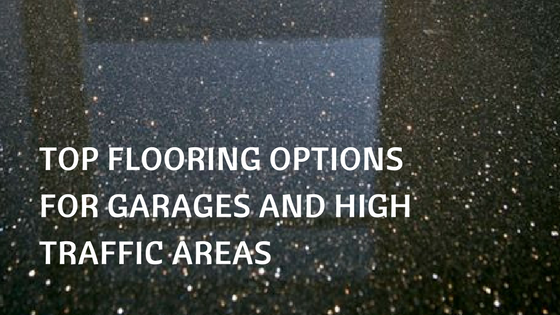Many types of businesses rely on durable flooring to maintain a professional appearance, optimal functionality and safety. Warehouses, commercial bathrooms, manufacturing plants, auto showrooms and buildings with locker rooms all share this requirement.
If you own one of these or a similar type of business, you may not be familiar with the commercial flooring options available to you. Here’s a look at five of the most durable options you have to choose from.
Hard Tile Ceramic Flooring
Ceramic tiles are made of clay. Thin slabs are coated with a glaze and fired in a kiln. They come in wide variety of shapes, sizes and colors to fit the look of your business.
Benefits
Ceramic is known for being easy to clean, making this a good choice for locker rooms and bathrooms where germs like to linger. It’s also relatively durable and versatile, with the option to be installed on floors, walls, counters and other surfaces. Ceramic is a low-maintenance material you can install yourself. The cost is also relatively low compared to other commercial flooring materials.
Drawbacks
If your business involves transporting heavy objects, ceramic may not be the right choice. These tiles can crack if large objects come crashing down. This can cause a major aesthetic problem. After all, even if you attempt to replace the damaged tile, the fact that size and color can vary between batches makes it difficult to match the original tiles.
Concrete Sealers
Choose from acrylic/latex sealer and urethane sealer. You can find these at a local home center here in Pittsburgh or online.
Benefits
Tougher than floor paint, concrete sealers are an easy, inexpensive way to protect the concrete floor in your auto showroom, warehouse or similar business. You can apply a sealer yourself with a brush or roller. The end product dries to a clear satin or semi-gloss finish, and you can have the sealer tinted to create the aesthetic you want for your business.
Drawbacks
Similar to floor paint, acrylic/latex sealer is vulnerable to chemical spills and wears off rather quickly. This makes it a poor choice for high-traffic areas, unless you’re willing to reapply the floor coating every few years. Of course, this increases the lifetime cost of acrylic/latex sealer.
Urethane sealer is more durable, but it doesn’t bond well to bare concrete, requiring additional floor preparation before applying the sealer. This is also more expensive than acrylic/latex sealer and requires you to wear a respirator during application.
Rollout Mats
Commercial flooring is also available in the form of rollout mats. These thick, rubbery floor coverings come in a wide array of lengths, widths, colors and patterns. You can use a utility knife to cut mats to the proper size.
Benefits
If only a small section of floor needs a protective surface, a rollout mat could be an affordable, professional-looking solution. Easy transportability and lack of permanence makes for great temporary floor protection when you need it.
Drawbacks
While rollout mats are surprisingly durable, they can be damaged or stained by hot tires and chemical spills. The mats can also be gouged by kickstands or cut by sharp falling objects. They also become slippery when wet, making them a safety hazard in commercial bathrooms and locker rooms.
In addition, as the temperature fluctuates between seasons, rollout mats are subject to expansion and contraction of up to 2 percent. This requires continual adjustments to prevent the mats from buckling.
Snap-Together Tiles
If you like the tile look of ceramic but need something that can bare heavier loads, snap-together rigid tiles are a good commercial flooring option.
Benefits
Laying tiles in your business gives you the option to create a unique-looking floor. It’s easy to install snap-together tiles yourself in a pattern that suits your aesthetic needs. These tiles are easy to clean and resistant against most types of chemicals. They expand and contract less than rollout mats, and you can also choose perforated snap-together tiles that drain water and snowmelt, making slippery spots less of an issue.
Drawbacks
Since this type of commercial flooring is rigid, it’s subject to scratching. Snap-together tiles also tend to make annoying clacking sounds when you walk on them, which may detract from the professional experience you want to provide your customers.
Professional Epoxy Floor Coating
Used for both residential and commercial applications, epoxy is essentially a thick, thermosetting resin applied directly to concrete floors. Two-part epoxy is the strongest, creating a chemical reaction that gives epoxy commercial floor coating its tremendous strength and durability.
Benefits
Epoxy is flexible, which makes it durable against impacts, chipping and surface abrasion. It’s also resistant against extreme temperatures, meaning hot tires have no affect on epoxy flooring. Choose a glossy finish in any solid or speckled color you want to achieve the right look for your business. Thick application can even hide imperfections in the concrete, providing an even, professional-looking floor for your business.
Cleaning epoxy is effortless. You simply sweep off dust and debris as needed and use mild water and soap to clean up spills. Chemical resistance helps prevent staining and etching. You also have the option to add non-slip aggregate to the top coating for good traction even when wet.
Drawbacks
Epoxy requires two-part application, which must be completed accurately and in quick succession for the best results. This requires professional application. You must also give the floor time to completely cure before you start using the space.
Epoxy is a durable, beautiful and long-lasting way to enhance the appearance, functionality and safety of your commercial floor. To learn more about installing an epoxy floor coating in your commercial building, please schedule a consultation with Boston Garage today.

.png)
.jpg)